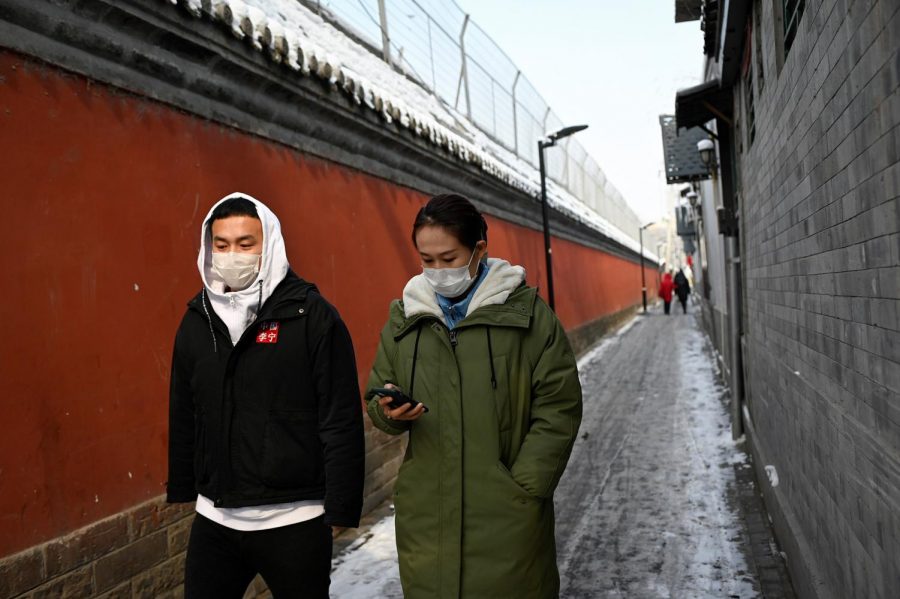Hardly the New Plague
The outbreak of the novel coronavirus has caused an entirely unwarranted, and just as harmful, outbreak of hysteria.
PHOTO | MCT Campus
People wearing protective face masks walk through an alley in Beijing on Friday, Feb. 7, 2020. (AFP/Getty Images/TNS)
Outbreaks of a new, unheard of sickness is a concept that has long both fascinated and terrified society even before humanity knew what caused them. In fiction, zombies and disease outbreaks are a popular horror trope. In real life, plagues and viruses – like the ebola outbreak in 2014-2016 – have garnered widespread attention as people feared a potential catastrophe on par with the black death. The recently appearing coronavirus coming out of the Wuhan province in China is no exception. However, the fear the novel coronavirus has caused is not only overblown, but ultimately damaging as well.
A coronavirus is a specific group of viruses that typically cause upper respiratory infections, or, in more severe cases, bronchitis and pneumonia. A few examples of coronaviruses are Middle East respiratory syndrome (MERS), severe acute respiratory syndrome (SARS) and, of course, the more recent unnamed coronavirus that’s been making headlines. The virus was first reported on Dec. 30 In the Wuhan province of China where doctors began investigating similar cases of viral pneumonia.
The virus is suspected to have started in a wet market, the Huanan Wholesale Seafood Market, as coronaviruses start by spreading from animals to humans. The Huanan Wholesale Seafood Market was closed on Jan. 1 and Wuhan banned the sale of live animals in markets on Jan. 26 in an attempt to curb the spread of the disease.

A citizen pays tribute to Dr. Li Wenliang at Li’s hospital in Wuhan in central China’s Hubei province on February 7, 2020. Li, regarded a whistleblower on the pneumonia outbreak, died of the novel coronavirus. (Shi Zhi/Utuku/Ropi/Zuma Press/TNS)
The current death toll of the novel coronavirus is over 722, with roughly 34,546 total cases so far. The first foreign death from the virus was an American on Feb. 8, who was still in China at the time of death. The man responsible for warning the public of the coronavirus, Dr. Li Wenliang, died on Feb. 7 after contracting the virus from a patient he was treating. Quarantines have been put into place for those who have recently been around infected areas, with a cruise ship being quarantined off the coast of Japan, and those entering the U.S. who could potentially be infected are being tested and quarantined. Twelve cases have been confirmed in the U.S., and the World Health Organization has declared it a “public health emergency,” alongside the Trump Administration.
Despite all of this, it’s important to note that the novel coronavirus is not a constantly fatal and extremely dangerous disease. The death toll is relatively small in proportion to reported cases, especially when considering that typically only those with severe cases seek out medical attention, meaning the count of those who are infected could be much larger. The disease currently has a two percent fatality rate, but with the number of potentially unreported cases, the true fatality rate is likely much smaller.
The risk of contracting the virus is dependent on exposure – something many citizens of not on the United States, but countries outside of China, are extremely unlikely to encounter. The CDC declared the health risk for American citizens to be “low.” WHO’s classification of the virus as a public health emergency was a precaution, according to the CDC, with the primary concern for countries without advanced medical care, in which an outbreak could be catastrophic. The novel coronavirus poses the largest risk to groups with compromised immune systems, such as the elderly, children and those with preexisting health issues. The actions of the CDC, WHO and other agencies are done in an effort to contain and control the virus, not because the virus is an extremely deadly threat.
![]() Loading ...
Loading ...
In addition to the risk of the virus being overblown, the surge of xenophobic sentiments towards the Chinese is entirely unnecessary as they are born out of unjust prejudice. Reports of racism against Chinese Americans have risen. The University of California at Berkeley’s health services center made a (now deleted) post on Instagram which listed xenophobia as a normal symptom of the coronavirus outbreak. The novel coronavirus is not a reason or excuse to discriminate against those with Chinese heritage, nor does the virus starting in China mean that all with Chinese heritage have it.
For those living outside of China, the coronavirus hardly warrants the hysteria it’s accumulated. It isn’t the new plague, and just like with Ebola, it isn’t the fault of the citizens in the country it originated in. It’s entirely reasonable to be afraid of potential health threats, but for now, the risk level is low.



